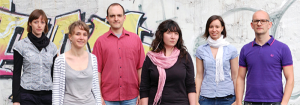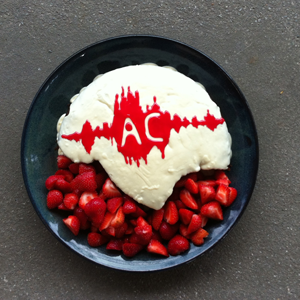Last week we had our first “Auditory Cognition” group summer BBQ. Research assistant Christoph Daube brought this amazing cake, sporting some anatomical knowledge and some serious patisserie skills. Thank you, Christoph!
Category: Editorial Notes
I am personally not entirely convinced whether Weblogs will survive as a tool for communication. Notwithstanding, I am supporting the idea of our Institute together with German public science magazine “Spektrum der Wissenschaft” to start a new blog, entitled “Neurocognition”. It’s hosted at scilogs.eu and scilogs.de. I have the honour to serve as one of the staff writers there, let’s see where this will take us.
For a start, I let go and wrote about my fascination with brain oscillations. Please pretend at least to be surprised on this choice of topic!
In addition to the exciting consonantal mismatch negativity work Mathias and Alexandra will be showing (TUESDAY AM session, posters UU10 and UU11), we will have the following posters this year. Come by!
Chris Petkov and I are showing our brand new data in the TUESDAY PM session, poster LL14.
I myself will be presenting in the WEDNESDAY AM session, XX15 – more alpha oscillations in working memory under speech degradation.
Finally, I also have the pleasure to be a co-author on Sarah Jessen’s, who is showing très cool multimodal integration data on voices and bodies under noisy conditions in the WEDNESDAY PM session, XX15.
There will be two poster presentations at SFN in Washington, DC., on the topic of auditory predictions in speech perception. The first poster, authored by Alexandra Bendixen, Mathias Scharinger, and Jonas Obleser, summarizes as follows:
Speech signals are often compromised by disruptions originating from external (e.g., masking noise) or internal (e.g., sluggish articulation) sources. Speech comprehension thus entails detecting and replacing missing information based on predictive and restorative mechanisms. The nature of the underlying neural mechanisms is not yet well understood. In the present study, we investigated the detection of missing information by occasionally omitting the final consonants of the German words “Lachs” (salmon) or “Latz” (bib), resulting in the syllable “La” (no semantic meaning). In three different conditions, stimulus presentation was set up so that subjects expected only the word “Lachs” (condition 1), only the word “Latz” (condition 2), or the words “Lachs” or “Latz” with equal probability (condition 3). Thus essentially, the final segment was predictable in conditions 1 and 2, but unpredictable in condition 3. Stimuli were presented outside the focus of attention while subjects were watching a silent video. Brain responses were measured with multi-channel electroencephalogram (EEG) recordings. In all conditions, an omission response was elicited from 125 to 165 ms after the expected onset of the final segment. The omission response shared characteristics of the omission mismatch negativity (MMN) with generators in auditory cortical areas. Critically, the omission response was enhanced in amplitude in the two predictable conditions (1, 2) compared to the unpredictable condition (3). Violating a strong prediction thus elicited a more pronounced omission response. Consistent with a predictive coding account, the processing of missing linguistic information appears to be modulated by predictive context.
The second poster looks at similar material, but contrasts coronal [t] with dorsal [k], yielding interesting asymmetries in MMN responses:
Research in auditory neuroscience has lead to a better understanding of the neural bases of speech perception, but the representational nature of speech sounds within words is still a matter of debate. Electrophysiological research on single speech sounds provided evidence for abstract representational units that comprise information about both acoustic structure and articulator configuration (Phillips et al., 2000), thereby referring to phonological categories. Here, we test the processing of word-final consonants differing in their place of articulation (coronal [ts] vs. dorsal [ks]) and acoustic structure, as seen in the time-varying formant (resonance) frequencies. The respective consonants distinguish between the German nouns Latz (bib) and Lachs (salmon), recorded from a female native speaker. Initial consonant-vowel sequences were averaged across the two nouns in order to avoid coarticulatory cues before the release of the consonants. Latz and Lachs served as standard and deviant in a passive oddball paradigm, while the EEG from 20 participants was recorded. The change from standard [ts] to deviant [ks] and vice versa was accompanied by a discernible Mismatch Negativity (MMN) response (Näätänen et al., 2007). This response showed an intriguing asymmetry, as seen in a main effect condition (deviant Latz vs. deviant Lachs, F(1,1920) = 291.84, p < 0.001) of an omnibus mixed-effect model. Crucially, the MMN for the deviant Latz was on average more negative than the MMN for the deviant Lachs from 135 to 185 ms post deviance onset (p < 0.001). We interpret these findings as reflecting a difference in phonological specificity: Following Eulitz and Lahiri, 2004, we assume coronal segments ([ts]) to have less specific (‘featurally underspecified’) representations than dorsal segments ([ks]). While in standard position, Lachs activated a memory trace with a more specific final consonant for which the deviant provided a stronger mismatch than vice versa, i.e. when Latz activated a memory trace with a less specific final consonant. Our results support a model of speech perception where sensory information is processed in terms of discrete units independent of higher lexical properties, as the asymmetry cannot be explained by differences in lexical surface frequencies between Latz and Lachs (both log-frequencies of 0.69). We can also rule out a frequency effect on the segmental level. Thus, it appears that speech perception involves a level of processing where individual segmental representations within words are evaluated.
New lab members joining
As of December 1, we will have two new members joining the Lab.
Björn Herrmann very recently received his Dr. rer. nat. from the University of Leipzig, after doing methodologically advanced worked on MEG and fMRI correlates of early auditory–syntactic interactions in language comprehension.
Dunja Kunke is a trained audiologist and will help us gear up the auditory testing routines in our lab; also, she will be of great help when we begin working with hearing-impaired listeners.
A warm welcome to both of you!

I am glad to report that the lab is in full flight. (From left to right: ) Anna Wilsch, Julia Erb, Dr. Mathias Scharinger, Dr. Molly Henry, and Antje Strauß have joined forces with me. We are having a splendid time finding out more about speech, degradation of it, and the neural processing of it all. Stay tuned for great project work coming from these bright minds in the years to come.
NB – I hope you don’t mind that we chose the charming back sides of Leipzig rather than our postmodern Institute building as a background. We actually do work just 100 meters from this spot. Maybe we should make it our new hang-out spot and bring neuroscience to the streets?
Autumn travels
Before our little lab gets into full throttle in late 2010/early 2011 with a great selection of new students and postdocs joining, I will be touring a bit with my most recent data.
For late October, my former co-supervisor Aditi Lahiri has kindly invited me to give a talk in Oxford.
In November, I will be attending the Neurobiology of Language Conference in San Diego and present our α‑band in spectrally vs. temporally degraded word comprehension data.
Directly following is the Society for Neuroscience conference, in San Diego as well. Come and find us in a Nano-symposium Jonathan Peelle has kindly put together.
It will take place on Wednesday afternoon (last day), November 17, and will feature a great selection of speakers from our field.
Spread the news: We are hiring for 2011.
The Max-Planck-Institute for Human Cognitive and Brain Sciences (MPI–CBS) in Leipzig and its newly established Max Planck Research Group on “Auditory Cognition”, led by Jonas Obleser, are now offering
Postdoc and PhD positions
for up to 3 years, preferably starting by January 2011.
Postdoc applicants: Successful candidates will have a PhD in cognitive neuroscience, psychology, or natural sciences. Prior experience with either fMRI or EEG/MEG methods is expected, and an interest in further applying and combining both domains in their research is highly desirable. The successful candidate will share our enthusiasm in problems of hearing and listening comprehension, and ideally has already demonstrated this by contributing to the field, although researchers with a background in visual or other neuroscience are of course also encouraged to apply. He or she should have a solid methods background; hands-on experience in problems of data and statistical analysis, and should be willing to co-supervise the PhD and Master students in the group. The position offered does not include any teaching obligations.
PhD applicants: The candidates must have a master degree (or equivalent) in psychology, cognitive sciences, neuroscience, medicine, or a related field. Proficiency in oral and written English is necessary. PhD students will have the opportunity to participate in the curriculum of the International Max-Planck Research School.
Starting date for all positions is flexible. Salary is dependent on experience and based on MPI stipends or equivalent salary according to German Public service regulations.
The research will be conducted at the MPI–CBS in Leipzig, Germany, an internationally leading centre for cognitive and imaging neuroscience equipped with a 7.0 T MRI scanner, three 3.0 T MRI scanners, a 306 channels MEG system, a TMS system and several EEG suites. All facilities are supported by experienced IT and physics staff. Our institute (just 190 km, or 70 minutes by train, south of Berlin) offers a very international environment, with English being the language spoken in the laboratory. It offers a friendly and generous environment of researchers with diverse backgrounds and with an excellent infrastructure.
In order to increase the proportion of female staff members, applications from female scientists are particularly encouraged. Preference will be given to disabled persons with the same qualification.
Applications should be kindly sent to personal [at] cbs.mpg.de using the code “PD 2÷2010” for Postdoc or ”D5/2010” for PhD applications in the subject. Please send your email below as a single, appropriately named pdf attachment and should enclose a cover letter (max. 2 pages) that also specifies your future research interests; a CV; up to three representative reprints; and contact details of 2 personal references. This call remains open until the positions are filled.
For further details please contact Dr Jonas Obleser, Max Planck Institute for Human Cognitive and Brain Sciences, Leipzig, Germany, obleser [at] cbs [·] mpg [·] de

